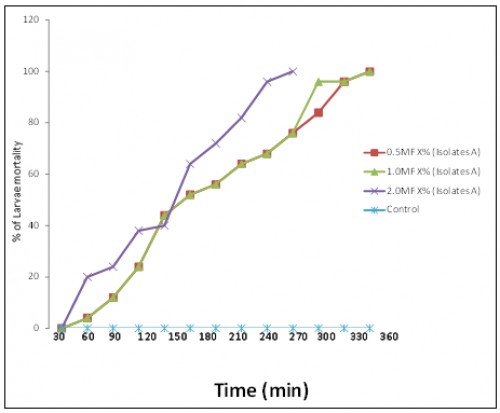In vitro evaluation of Bacillus thuringiensis larvicide effect on Anopheles subpictus larvae
Author(s): Etim Lawrence B
Abstract: Microbial larvacide effects of Bacillus thuringiensis isolates on mosquito (Anopheles subpictus) larvae was investigated in vitro. The isolates obtained were coded as BTA, BTB and BTC. The bacilli load were determined as MacFallan Standard 0.5(1.0 × 108 cell), 1.0 (3.0 × 108 cell) and 2.0 (6 × 108 cell) and time ranging from 0 – 360 mins. The results obtained showed a significant (p > 0.5 and r =0.1) correlation between the percentage mortality rate of the mosquito larvae, the bacilli load, time of incubation and the isolates type. The positive increase in larvae (percentage) mortality rate against different bacilli concentrations at various times (minutes) were as follows: 0.5 MacFallan (30:12%, 120:44%, 240:68%), 1.0 MacFallan (30:18%, 120:52%, 240: 72%) and 2.0 MacFallan (30: 23%, 120: 68%, 240:92%). Secondly, each isolate demonstrateted slightly different and insignificant (p>0.1) mortality rate; example at 0.5 MacFallan, isolate BTA, BTB and BTC were seen to have (30:4%, 6% and 5%) while at 120:44%, 32%, 46% respectively. Results obtained has shown that proper formulation of B. thuringiensis (var) would be used as a biopesticide to control mosquito larvae at breeding sites, hence the control of malaria and other mosquito vector borne diseases in the public health sector.
 Fig.:
Fig.: Larvicidal activity of Bacillus thurinqiensison mosquitoes larvae at 0.5, 1.0 and 2.0 Mc Farlane (Isolate C)
How to cite this article:
Etim Lawrence B. In vitro evaluation of Bacillus thuringiensis larvicide effect on Anopheles subpictus larvae. Int J Mosq Res 2019;6(3):45-49.



